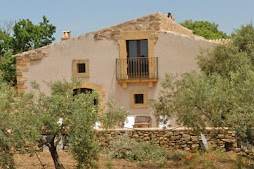 Sicilian Wine and Climate
Sicilian Wine and ClimateSicily has a Mediterranean climate. In simple terms, that means summers are hot and the winters aren't that cold. It almost never rains in the summer months and only very lightly during the winters, which are famous for being brief. They generally start in December and last only until February. The spring and fall are warm and sunny, and frost is rare in the winter, making Sicily an ideal environment for wine production.
Sicily is also lucky to have rocky soil. This would be a problem with almost any crop other than grapes, but for wine production it just happens to be ideal. Rocks absorb heat throughout the day and release it slowly at night. People used to use rocks as "warming stones," placing them by the fire and then putting them in their beds at night. Another advantage of rocky soil is its ability to stay dry. Grape vines don't like to be wet, and rocky soil allows their roots to grow deep while staying dry.With Sicily's perfect climate and rocky soil, it's no wonder that it has more vineyards than any other region in Italy. It's also not a surprise that so many different varieties of grapes are able to thrive there. While many of the grapes are considered native to the island, others were brought from different regions in Italy because of their affinity for producing high yields. However, with recent efforts to place more focus on quality and less on quantity, Sicilian winemakers are concentrating on the use of native varieties. Some of the most famous grapes considered to be native to the island are Frappato, Mantellato, Nerello Mascalese, Nero d'Avola and Perricone (red wine), and Carricante, Catarratto, Grecanico, Grillo, Malvasia delle Lipari, Muscat Blanc and Zibibbo (white)

No comments:
Post a Comment